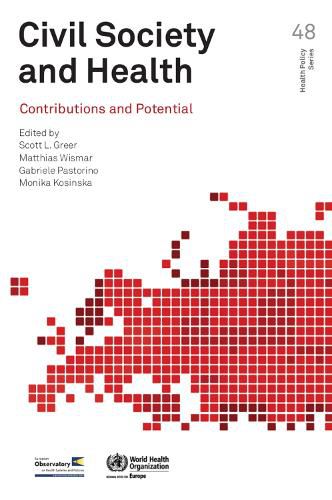Readings Newsletter
Become a Readings Member to make your shopping experience even easier.
Sign in or sign up for free!
You’re not far away from qualifying for FREE standard shipping within Australia
You’ve qualified for FREE standard shipping within Australia
The cart is loading…






Civil Society Organizations (CSOs) can make a vital contribution to public health and health systems, but harnessing their potential is complex in a Europe where government-CSO relations vary so profoundly. This study is intended to outline some of the challenges and assist policy-makers in furthering their understanding of the part CSOs can play in tandem and alongside government. To this end it analyses existing evidence and draws on a set of seven thematic chapters and six mini case studies. They examine experiences from Austria, Bosnia-Herzegovina, Belgium, Cyprus, Finland, Germany, Malta, the Netherlands, Poland, the Russian Federation, Slovenia, Turkey and the European Union and make use of a single assessment framework to understand the diverse contexts in which CSOs operate. The evidence shows that CSOs are ubiquitous, varied and beneficial, and the topics covered in this study reflect such diversity of aims and means: anti-tobacco advocacy, food banks, refugee health, HIV/AIDS prevention and cure, and social partnership. CSOs make a substantial contribution to public health and health systems with regards to policy development, service delivery and governance. This includes evidence provision, advocacy, mobilization, consensus building, provision of medical services and of services related to the social determinants of health, standard setting, self-regulation and fostering social partnership. However, in order to engage successfully with CSOs, governments do need to make use of adequate tools and create contexts conducive to collaboration. To guide policy-makers working with CSOs through such complications, and help avoid some potential pitfalls, the book outlines a practical framework for such collaboration. This suggests identifying key CSOs in a given area; clarifying why there should be engagement with civil society; being realistic as to what CSOs can or will achieve; and an understanding of how CSOs can be helped to deliver.
$9.00 standard shipping within Australia
FREE standard shipping within Australia for orders over $100.00
Express & International shipping calculated at checkout
Civil Society Organizations (CSOs) can make a vital contribution to public health and health systems, but harnessing their potential is complex in a Europe where government-CSO relations vary so profoundly. This study is intended to outline some of the challenges and assist policy-makers in furthering their understanding of the part CSOs can play in tandem and alongside government. To this end it analyses existing evidence and draws on a set of seven thematic chapters and six mini case studies. They examine experiences from Austria, Bosnia-Herzegovina, Belgium, Cyprus, Finland, Germany, Malta, the Netherlands, Poland, the Russian Federation, Slovenia, Turkey and the European Union and make use of a single assessment framework to understand the diverse contexts in which CSOs operate. The evidence shows that CSOs are ubiquitous, varied and beneficial, and the topics covered in this study reflect such diversity of aims and means: anti-tobacco advocacy, food banks, refugee health, HIV/AIDS prevention and cure, and social partnership. CSOs make a substantial contribution to public health and health systems with regards to policy development, service delivery and governance. This includes evidence provision, advocacy, mobilization, consensus building, provision of medical services and of services related to the social determinants of health, standard setting, self-regulation and fostering social partnership. However, in order to engage successfully with CSOs, governments do need to make use of adequate tools and create contexts conducive to collaboration. To guide policy-makers working with CSOs through such complications, and help avoid some potential pitfalls, the book outlines a practical framework for such collaboration. This suggests identifying key CSOs in a given area; clarifying why there should be engagement with civil society; being realistic as to what CSOs can or will achieve; and an understanding of how CSOs can be helped to deliver.